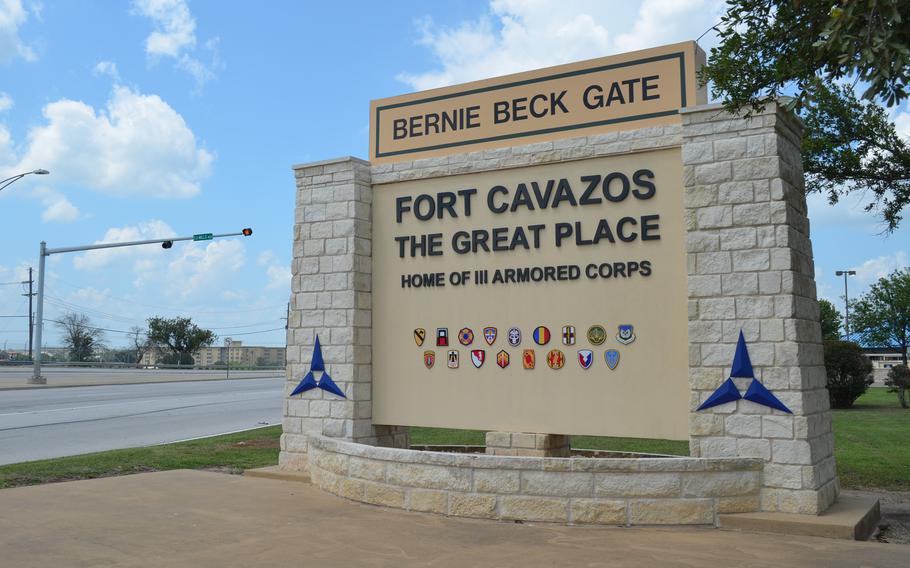
Entrance to Fort Cavazos, Texas, where two soldiers each face a court-martial in the shooting death of a sergeant. (Rose L. Thayer/Stars and Stripes)
FORT CAVAZOS, Texas — Two soldiers and their sergeant got together on the night of Aug. 26 at a house on post where they drank heavily. It ended with one dead from a gunshot wound and the other two disagreeing about how it happened, according to evidence discussed Friday in court.
Spcs. Nicholas Lowery and Rene Heber told agents for the Army Criminal Investigation Division on Aug. 27 that they watched in horror as Sgt. Alfredo Martinez shot himself dead at Fort Cavazos. However, Lowery changed his story during an 11-hour interview with CID agents on Sept. 7, where he told an investigator that he shot Martinez.
Lowery is charged with unpremeditated murder and two counts of obstructing justice, according to court documents. Heber is charged with accessory to murder after the fact, accessory to involuntary manslaughter after the fact and obstructing justice, according to the 1st Cavalry Division. Both men have pleaded not guilty, according to online court records.
An autopsy on Martinez could not determine the manner of his death and prosecutors said they could not find a motive or racial bias in evidence that included 14 electronic devices.
All three soldiers were assigned to the division’s Sustainment Support Brigade.
In Friday’s hearing at the Finkelstein Judicial Center, attorneys argued before military judge Lt. Col. Joseph Venghaus about what evidence should be included in Lowery’s court-martial in August and what consultants the defense can hire to build its case.
The defense asked the judge not to allow Lowery’s Sept. 7 confession in the trial, arguing he was not properly read his rights and was under duress. As part of his rights, Lowery was told he was under investigation for manslaughter, and he is now charged with murder, said Benjamin Young, a defense attorney for Lowery.
“They asked, ‘Did you intend to murder him?’” Young said. “This was an illegally performed rights advisal.”
CID Special Agent Bryce Dunn testified he had Lowery read aloud the rights afforded to him before the interrogation began and believes the soldier knew he could leave at any time. He was afforded several bathroom and cigarette breaks, which is in part what made the interview so long, the agent said.
While Lowery never asked to leave, he complained several times about the lack of air-conditioning in the building on a hot September day. The building’s cooling unit was broken, and Dunn said he told the soldier all the rooms were the same temperature.
For the first roughly nine hours, Lowery stuck to his story that Martinez shot himself, and even walked agents through the events of the night in a recreation of the room built by CID. Dunn left the interview at about hour nine, he said.
Lowery then requested to speak with him again, questioning Dunn about the repercussions of saying untrue things in an interview. It was then that Lowery told Dunn he shot Martinez and walked special agents through a different scenario of the night in the recreated scene.
The judge did not decide during the hearing whether the confession can be used, nor did he decide whether the defense can hire an expert on digital forensics, which would allow Lowery’s legal team to comb through cellphones and electronic devices on their own.
Lowery is due in court April 25 and his court-martial is scheduled to begin Aug. 5. Heber has a hearing April 15 and his court-martial is scheduled to begin May 20.
Thayer.rose@stripes.com
Twitter: @Rose_Lori